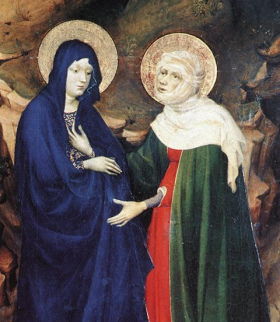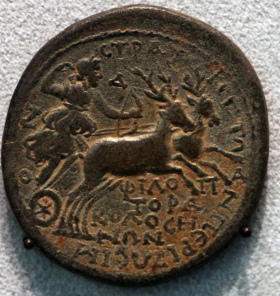Elizabeth, the wife of Zacharias, was also the cousin of Mary, Jesus' mother. The New Testament declares she was a righteous woman who was a descendant of Aaron (Israel's first High Priest).
Elizabeth had been unable to have children her entire life. When she was old, however, God healed her and allowed her to become pregnant with John the Baptist. After she was six months pregnant her cousin Mary came and stayed with her for three months (Luke 1:56).

Please see our listing for Bar-jesus.
Epaphras
Colossians 1:7, 4:12, Philemon 1:23
Epaphras, who lived in Colosse (Colossae), was considered a faithful fellow servant of Christ. The apostle commends him to the church as someone who was always praying for their spiritual wellbeing. Epaphras not only spearheaded the spreading of the gospel in Colosse but also in nearby Laodicea and Hierapolis.
Epaphras, at the time of the writing of Philemon, was a fellow prisoner with Paul in Rome.

Epaphroditus
Philippians 2:25 - 30, 4:18, 23
Epaphroditus was specially selected by those in Philippi to deliver financial support, clothes and other necessities to the apostle while he was a prisoner in Rome (late 61 to early 63 A.D.). He was a leader in the Philippian church who was considered a "fellow soldier" in spreading the gospel and serving the church.
Epaphroditus, while attending to Paul's needs in prison, gets so sick that he almost dies (Philippians 2:27). The apostle commended him to the Philippians for this selfless act and willingness to place his own life at risk for the cause of Christ. His extended sickness is one example that Paul (and others) did not have the miraculous power to heal someone whenever they wished.
After Epaphroditus' lengthy recovery he was sent back home with the Philippian epistle to deliver.
Epenetus (Epaenetus)
Romans 16:5
Epenetus was one of the first converts to Christianity in the Roman province of Achaia. This province included the cities of Athens and Corinth. It is unknown whether or not Paul's preaching led Epenetus to become a Christian.
Erastus
Acts 19:22, Romans 16:23, 2Timothy 4:20
The name of Erastus is recorded three times in the New Testament. It is unclear, however, whether all these references are to the same person.
Paul, during his extended stay in Ephesus, sent Erastus and Timothy ahead of him into Macedonia to help bolster the churches in the area. Later, in the book of Romans written from Corinth, Erastus "the steward of the city" (Romans 16:23) sent his greetings to those in Rome. The last time he is mentioned, in 2Timothy, it states he was living in Corinth at the time of the letter.
Eubulus was a Roman Christian who sent his greetings to Timothy through the last letter Paul would author before his death. Nothing more is known about him.
Eunice was the mother of Timothy, Paul's traveling companion, fellow evangelist and close friend. She was a Jew by birth who married a Greek (Gentile, see Acts 16:1) and lived in Lystra. She later converted to Christianity along with her mother Lois.
Both Eunice and Lois studied the Old Testament and passed on their knowledge to young Timothy. In his last, and quite affectionate, letter to Timothy, Paul encourages his friend by reminding him his "unfeigned faith" came from his mother and grandmother.
Euodia (Euodias)
Philippians 4:2 - 3
Euodia was a prominent female Christian living in Philippi, where the church first took root among the city's females (Acts 16:13 - 15). Paul, in his letter to the church, asked her and Syntyche, another Christian lady, to settle their differences. Both of them had helped him in the work of the gospel. It is unknown the exact nature of their disagreement or whether it was successfully resolved.
Eutychus was a young man who, after falling asleep listening to Paul preach in Troas, fell out a window and died. The apostle went immediately to him and, after stretching himself on the young adult, miraculously healed him and brought him back to life! Eutychus is the only person recorded to have been resurrected by the apostle. Interestingly, Eutychus' name means "fortunate" or "well-fated!"
Felix
Acts 23:24 - 26, 24:3, 22 - 27, 25:14
Felix is the Roman Procurator of Judea from 52 to 60 A.D. His wife Drusilla was a great-granddaughter of Herod the Great. Josephus discusses Felix in his Antiquities of the Jews, primarily in chapters 7 and 8 of book 20.
Paul is sent to Felix after accused of causing a riot at Jerusalem's temple (Acts 21). The Procurator, in spite of Paul's innocence, keeps him in Caesarea's prison for two years hoping to be bribed (Acts 24:26 - 27). In 60 A.D. Felix, who was known as a mean and cruel ruler, is replaced as Procurator by Porcius Festus.
Festus (Porcius Festus)
Acts 24:27, 25:1, 4, 9, 12 - 14, 22 - 24,
26:24 - 32
Festus was Roman Procurator of Judea from 60 to 62 A.D. According to Josephus, he ruled wisely and justly, in contrast to his predecessor Felix. He was commended for ridding the Judean countryside of Sicarii bandits who were terrorizing the people (Antiquities of the Jews, Book 20, Chapter 9, Section 10).
Festus, immediately after taking on his new responsibilities, revisits the case against Paul who had been languishing in Caesarea's prison for two years. His offer to hold the apostle's trial in Jerusalem is rejected. Paul requests, as a Roman citizen, that his trial be held before the Emperor in Rome.
Fortunatus was a Christian in the Corinthian church. He traveled to see the apostle in Ephesus during his extended stay in the city (54 to 57 A.D.). The notation at the end of 1Corinthians, found in some Bible translations, asserts that he helped write the epistle that was dictated by Paul.
Gaius
Acts 19:29, 20:4, 1Corinthians 1:14
Romans 16:23
There are two different and important New Testament individuals named Gaius connected to the Apostle Paul. Another Gaius is connected to the Apostle John.
Gaius from the city of Derbe in Macedonia (Acts 19:29, 20:4), along with others, accompanied Paul during his third missionary journey. During Paul's extensive evangelism of Ephesus, he was seized by a mob stirred up by those whose businesses were suffering due to the gospel's impact. He was released at the behest of the city's clerk.
Another man named Gaius lived in Corinth, a large metropolis in the Roman province of Achaia. He was converted through Paul's preaching and was one of only two Corinthians personally baptized by the apostle. Gaius provided a place in Corinth for the apostle to stay in during his short third missionary journey visit. He, and the Corinthian church, greeted their brethren in Rome through the book of Romans written from the prosperous city.
The Apostle John's third epistle was sent to a man named Gaius (3John 1:1). Nothing is known about him except that He was a faithful church member who was highly praised by John. No Biblical evidence exists that links this Gaius with the other two connected to the Apostle Paul.
Gallio was appointed the new Proconsul of the Roman province of Achaia during Paul's first visit to Corinth. After assuming his position, the city's Jews dragged the apostle before him with the accusation that he was, "persuading men to worship God contrary to the law" (Acts 18:13, HBFV).
Gallio abruptly, and wisely, refused to hear the case made against Paul. In fact, he was so irritated that a religious disagreement, and not a Roman law related matter, was brought before him that he drove the Jews from his presence!
It is uncertain whether Gallio was forced to commit suicide, or was put to death, under Nero around 65 A.D.
Gamaliel was a well-known and highly respected Pharisaic Rabbi, scholar and member of the Sanhedrin. He was the grandson of Rabbi Hillel, another famous teacher of the law. It was Gamaliel's insight that tempered the Sanhedrin's initial judgment and punishment of the twelve apostles (Acts 5:17 - 41).
Gamaliel's religious learning is held in such high esteem that he is one of only seven Jewish doctors honored with the title of "Rabban." His understanding among the Jews earned him the designation as being the "beauty of the Law" (Life and Epistles of Paul).
The Apostle Paul stated he received his primary religious education through Gamaliel in Jerusalem.